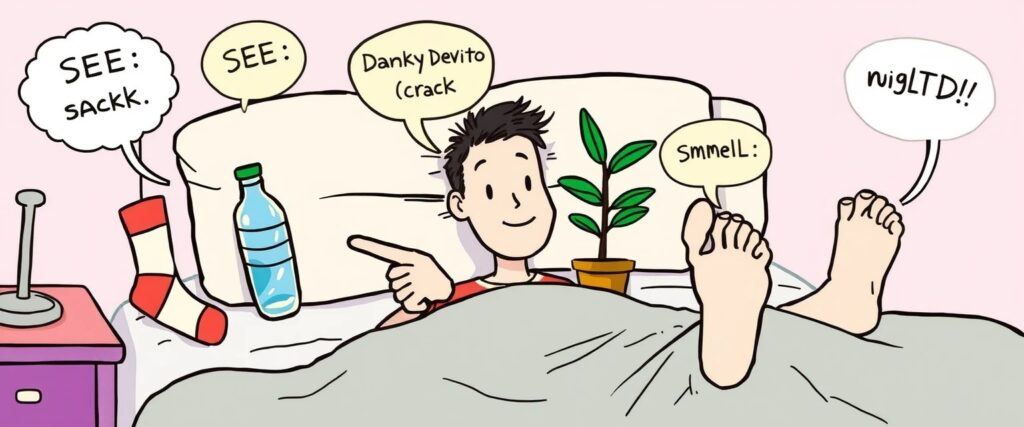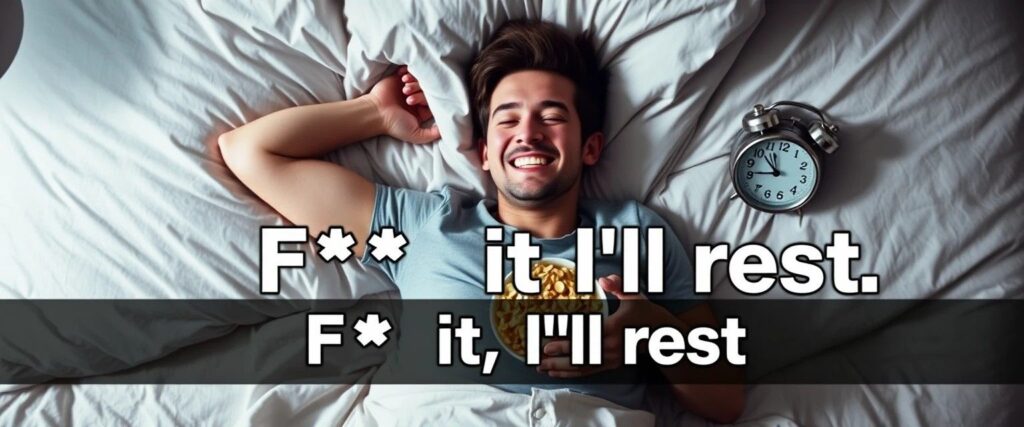Intro:If You’re Lying Awake Googling “How to Stop Overthinking at Night”, Start Here
Let’s cut to the chase: You’re reading this because your brain treats bedtime like a TED Talk on “All the Ways Life Could Go Wrong.” One minute you’re cozy under the covers; the next, you’re mentally rehearsing your response to a work email you might get next week or obsessing over whether you locked the front door (spoiler: you did).
Racing thoughts before sleep aren’t just annoying—they’re exhausting. And when you’re trapped in cycles of nighttime rumination, even “simple” advice like “just relax” feels like a slap in the face. I get it. I’ve been the person Googling how to stop overthinking at night at 3 a.m. while eating cold pizza over the sink.
But after years of trial, error, and talking to sleep experts, I’ve cracked the code. These 7 tricks aren’t about perfection. They’re about giving your sleep anxiety the middle finger and reclaiming your right to rest. Let’s dive in.
Table of Contents
1. Ditch the “Perfect” Bedtime Routine (Seriously, Burn the Lavender Candles)

We’ve all seen the Instagram posts: “My 10-step nighttime routine cured my anxiety!” Cue photos of matcha lattes and journaling by fairy lights. But here’s the truth: If you’re already overwhelmed, adding more steps to your day will only fuel nighttime rumination.
Try This Instead:
- Replace “Shoulds” with “Coulds”
Hate meditation? Blast Lizzo and dance it out. Can’t journal without spiraling? Doodle angry stick figures. The goal isn’t Instagram-worthy zen—it’s distracting your brain long enough to hit the “off” switch. - The “I’m a Burrito” Hack
Wrap yourself in a weighted blanket (or three regular ones), put on a podcast about literally anything other than self-improvement (My Dad Wrote a Porno is a chaotic gem), and let your brain zone out.
Real-Life Win:
Sarah, a nurse and mom, swapped her failed meditation app for The Great British Bake Off reruns. “Watching Paul Hollywood judge soggy bottoms is weirdly soothing. I’m asleep by the first commercial break.”
2. Write a “Worry List” (Then Light It on Fire… Safely)

“Journal your thoughts” sounds great—until you’re staring at a blank page at midnight, convinced your handwriting alone will summon demons. Here’s a hack that actually works:
The Brain Dump Method:
- Grab any scrap of paper (receipts, old takeout menus, your kid’s homework—they’ll never know).
- Scribble down every worry, no matter how irrational:
- “What if I get fired for that typo?”
- “Why did I say ‘you too’ to the dentist?”
- “Is the cat plotting revenge?”
- Crumple it up and throw it away. Say out loud: “I’ll deal with you tomorrow… maybe.”
Why It Works:
A 2020 study in Behavioral Sleep Medicine found that externalizing worries reduces racing thoughts before sleep by tricking your brain into thinking the problem is “handled.”
3. Play the “5 Senses” Game (Like You’re 8 Years Old)

When sleep anxiety hits, trying to “think positive” is like slapping a Band-Aid on a broken leg. Instead, distract your brain with a sensory scavenger hunt:
- Spot 3 Weird Things in Your Room
- The ceiling crack that looks like Danny DeVito.
- The mismatched socks peeking out of the laundry basket.
- The plant you’ve somehow kept alive for six months (name it).
- Sniff Something Random
Raid your nightstand. What does that half-empty water bottle really smell like? (Spoiler: regret.) - Do a “Toe Wiggle” Meditation
Focus on wiggling each toe one by one. It’s so ridiculous, your brain will go, “Wait… what are we doing?”
Pro Tip: Keep a “worry stone” (a smooth rock, a Lego piece, whatever) under your pillow. When racing thoughts before sleep strike, rub it and think, “This is my ‘nope’ button.”
For more quick fixes, try these 5-minute grounding exercises for anxiety to reset your mind. or The 3-3-3 Rule for Anxiety: A Simple Grounding Technique to Regain Control
4. Roast Your Inner Critic Like a Sassy Best Friend

Your 2 a.m. inner monologue probably sounds like a drill sergeant: “You’re failing at life. Also, your breath stinks.” Time to fight fire with sarcasm.
Try These Comebacks:
- “Wow, thanks for the TED Talk. Can I sleep now?”
- “Cool story, bro. Tell it again with more tears.”
- “Is this a podcast? Because I’d like to unsubscribe.”
Real Talk:
Mark, a teacher, imagines his anxiety as a grumpy podcast host. “I picture hitting ‘stop’ on the episode. It’s dumb, but it works.”
5. Surrender to the Awake-ness (Seriously, Stop Trying)

The harder you chase sleep, the faster it runs. Paradoxical intention—a fancy term for “giving zero flips”—is proven to reduce sleep anxiety.
How to Do It:
- Promise yourself: “I don’t need to sleep. I’ll just lie here like a starfish.”
- Set a boring backup plan: “If I’m not asleep in 20 minutes, I’ll reorganize my sock drawer.” (You’ll be snoring by minute 19.)
Science Backs This: A 2022 study found that accepting wakefulness reduces frustration and helps 73% of participants fall asleep faster.
If you’re wondering which option truly works, you might want to explore The Best Mood Stabilizer for Anxiety to get a clearer picture.
6. Turn Your Bedroom into a “Cave” (But with Better Wi-Fi)

Your environment matters. You don’t need a $1,000 mattress—just a few tweaks to hack your primal brain:
- Pitch Black FTW:
No blackout curtains? Tape a beach towel over the window. Or go full goblin mode and wear a sleep mask over your eyes. - White Noise Hack:
Play “brown noise” on YouTube (it’s like a fan, but deeper). One dad uses a recording of his cat purring: “It’s weirdly soothing… or I’m just sleep-deprived.” - The “Cold Pillow” Trick:
Flip your pillow to the cool side and pretend you’re sleeping on a cloud. (Or a glacier. Whatever works.)
7. Call in the Pros (Yes, It’s Badass)

If nighttime rumination feels like a 24/7 job, it’s time to outsource. Asking for help isn’t weak—it’s warrior-level self-care.
Signs You Need Backup:
- Your Google history is just “why can’t I sleep?” and “am I dying?”
- You’ve cried over burnt toast.
- Your friends say, “You look… tired” (code for “Are you okay?”).
What Worked for Real Humans:
- Sleep Podcasts: Sleep With Me—the host rambles about nothing until you pass out.
- CBT-I Apps: Sleepio offers science-backed tricks without leaving your bed.
- Therapy: Apps like BetterHelp let you text a therapist at 2 a.m. in your PJs.
Read More : 5 Apps That Saved My Life During Anxiety Attacks
Final Thoughts: You’re Not Broken—This is Just Hard
Some nights, you’ll nail all 7 steps. Other nights, you’ll binge-watch raccoon TikToks until sunrise. Both are okay.
Progress isn’t linear. Maybe tonight, you’ll try one thing from this list. Maybe you’ll just whisper, “F** it, I’ll rest.”* That’s enough.
Remember: Racing thoughts before sleep don’t make you “too much.” They mean you care—about your job, relationships, life. But you deserve peace, too.
Need a Midnight Pep Talk?
Bookmark this article (or screenshot the steps). And if all else fails, DM me. I’ve got a folder of sloth videos ready to go. 🦥
FAQS ABOUT: How to Stop Overthinking at Night
- “Why do I overthink so much at night?”
Answer: At night, distractions fade, stress hormones like cortisol spike, and your brain’s logical prefrontal cortex “powers down,” letting the emotional amygdala hijack your thoughts. Evolution also wired us to stay alert in quiet moments (thanks, ancestors!). - “How do I shut my brain off to sleep?”
Answer: Try the 5-4-3-2-1 grounding technique (name 5 things you see, 4 things you touch, etc.) or “brain dump” journaling. These tricks force your mind to focus on the present, not hypothetical disasters. - “Can anxiety cause nighttime overthinking?”
Answer: Absolutely. Anxiety fuels a loop of nighttime rumination—replaying past mistakes or fearing future scenarios. If this happens nightly, it might signal chronic anxiety or sleep disorders. - “What foods make overthinking worse at night?”
Answer: Avoid caffeine (obviously), sugar crashes, and heavy meals before bed. Alcohol also disrupts REM sleep, leaving you more prone to midnight mental spirals. - “Why can’t I stop thinking about something that happened years ago?”
Answer: Unresolved emotions or trauma often resurface at night. Try writing a letter (you don’t have to send it) or reframing the memory with self-compassion: “I did the best I could then.” - “Is overthinking at night a sign of depression?”
Answer: It can be. Depression often amplifies negative thoughts when you’re alone. If overthinking pairs with hopelessness or fatigue, talk to a therapist. - “How do I stop worrying about tomorrow?”
Answer: Write a “tomorrow’s problem” list and promise to tackle it in the morning. Then, visualize locking it in a mental drawer. Sounds silly, but studies show it reduces pre-sleep anxiety. - “Can meditation help with racing thoughts before bed?”
Answer: Yes, but skip the “empty your mind” cliché. Try body scan meditations (focus on relaxing each body part) or apps like Calm with sleep-specific stories. - “Why do I overthink relationships at night?”
Answer: Nighttime loneliness magnifies insecurities. Keep a “relationship wins” journal by your bed—jot 1 positive interaction daily to counter negative bias. - “How long does it take to stop overthinking at night?”
Answer: Progress starts in weeks with consistency, but it’s not linear. Celebrate small wins (e.g., falling asleep 10 minutes faster). For chronic cases, CBT-I therapy can show results in 4–6 weeks. - “Does screen time make nighttime overthinking worse?”
Answer: Yes! Blue light suppresses melatonin (your sleep hormone), and doomscrolling feeds anxiety. Try a “screen sundown” 90 minutes before bed—swap TikTok for a paperback or podcast. - “When should I see a doctor about overthinking at night?”
Answer: If it disrupts daily life for 3+ weeks, causes severe fatigue, or you’re using alcohol/sleep aids to cope. Therapists or sleep specialists can offer tailored solutions.

Pingback: 7 Anxiety Myths Everyone Believes (But Are Totally Wrong) | Anxieto
Pingback: Stop Overthinking in Relationships: : 9 Life-Changing Tips to Reclaim Your Peace | Anxieto
Pingback: Can Anxiety Cause Insomnia? 9 Smart Solutions for Peaceful Sleep | Anxieto